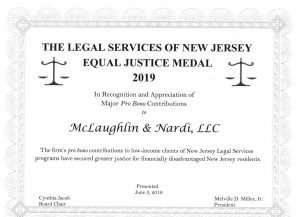
Yes, New Jersey property law allows for the partition of the property, or if a partition is not feasible, then the forced sale of real estate which is owned by more than one person.
Often real estate is owned by several people. This commonly occurs through an inheritance. For example, parents, in their last wills and testaments, bequeath their real property to their three children in equal shares and do not include directives that the property be sold and the proceeds be split equally. During the administration of the estate, the executor transfers title to the property to the three siblings. Often, one of the siblings had been caring for the now deceased parents and is still residing in the property. Yet, the other two siblings want the property to be sold so that they can have their share of the proceeds. This can be a difficult time and can result in significant disputes and turmoil within the family. If the child residing in the property cannot afford to buy out the remaining siblings and cannot (or will not) qualify for a mortgage, the remaining siblings are often at a loss on how to proceed. New Jersey Estate law provides a mechanism to resolve the dispute, the partition action.
If a co-owner of real property refuses to sell the property and divide the proceeds of sale in accordance with each co-owners’ ownership interests, a partition action is the only method available to a person who owns a share of real estate as a tenant in common or joint tenant can separate his or her interest from the other co-owners. If the joint tenants are spouses this remedy is not available to them.) In order to start an action for partition, an action must be filed in the Superior Court of New Jersey, usually filed in the county where the property is located.
 The Federal Fair Labor Standards Act establishes rates of minimum wage and overtime pay which employers must pay to their employees. Employees successfully suing their employers for violations of these requirements can recover their lost wages, and their employers will be required to pay their attorneys fees and litigation costs. The Fair Labor Standards Act provides that willful violations of these requirements will result in double damages – ie., the employer will be required pay the employee twice the amount of wages or overtime it did not pay. A willful violation also extends the statute of limitations for suing from two years to three.
The Federal Fair Labor Standards Act establishes rates of minimum wage and overtime pay which employers must pay to their employees. Employees successfully suing their employers for violations of these requirements can recover their lost wages, and their employers will be required to pay their attorneys fees and litigation costs. The Fair Labor Standards Act provides that willful violations of these requirements will result in double damages – ie., the employer will be required pay the employee twice the amount of wages or overtime it did not pay. A willful violation also extends the statute of limitations for suing from two years to three. New Jersey Lawyers Blog
New Jersey Lawyers Blog








